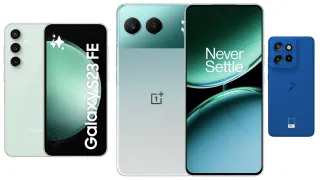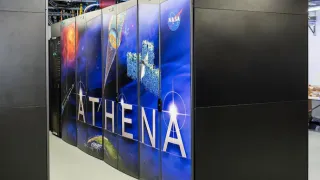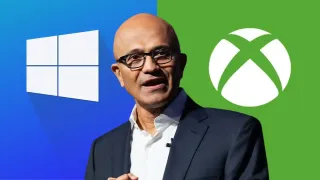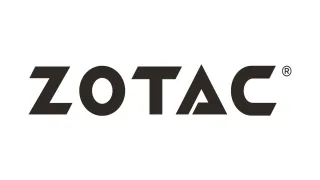In 2018, Apple became the first company to reach a market capitalization of $1 trillion. A few years later, six of the largest companies by market cap have exceeded that number. Although the top spot has changed hands on multiple occasions, Apple has spent the most time there and is currently the most valuable company in the world.
While tech companies dominate the top of the stock market, there are other sectors represented, including oil, insurance, medical companies, and luxury brands. Read on to see the 20 biggest companies and where they stand as of November 2023.
Largest companies by market cap
1. Apple

Market cap: $2.98 trillion (as of Nov. 23)
Revenue (TTM): $383.93 billion
Gross profit (TTM): $166.82 billion
Five-year annualized return: 27.38%
Year founded: 1976
Tech giant Apple is proof of how far high-quality products and strong brand loyalty can go. It first became the world's most valuable company on Aug. 9, 2011, just 15 days before Steve Jobs resigned as CEO. Although other companies have surpassed it at times since then, Apple has held the top spot for the better part of a decade. It also holds the distinction of being the first company to hit market caps of $1 trillion, $2 trillion, and $3 trillion.
Apple built its success off sales of its wildly popular products, including the iPhone, MacBook, and AirPods. Next year, it plans to launch the Apple Vision Pro, a mixed-reality headset. It has also branched out into services, including its Apple TV+ streaming service.
2. Microsoft

Market cap: $2.81 trillion (as of Nov. 23)
Revenue (TTM): $218.31 billion
Gross profit (TTM): $151.06 billion
Five-year annualized return: 26.66%
Year founded: 1975
Considering the popularity of the Windows operating system, it’s no surprise that Microsoft has consistently ranked as one of the largest companies in the world. Nearly 70% of computers use Windows, according to Statcounter. While it's most famous for Windows, Microsoft also has a diverse selection of products and services that has helped to build on its success, including:
Office Suite software
Azure cloud platform
Xbox video game consoles
Surface computer and tablets
Microsoft has been the world's largest company before, and it briefly surpassed Apple for the biggest market cap in 2021. However, Apple reclaimed the top spot a month later.
3. Saudi Arabian Oil

Market cap: $2.15 trillion* (as of Nov. 23)
Revenue (TTM): $551.97 billion*
Gross profit (TTM): $283.65 billion*
Year founded: 1933
Converted from Saudi riyals.
Saudi Arabian Oil, also known as Saudi Aramco, is an energy and chemicals company. Owned by the Saudi Arabian government, it has the largest daily oil production and the second-largest proven crude oil reserves of all oil companies.
Since Saudi Aramco is largely dependent on oil prices, it went through significant ups and downs in 2022. Heavy oil demand helped it claim the top spot in terms of market cap early in May of last year, but when demand fell, it was surpassed again by Apple and Microsoft. To diversify its portfolio, Saudi Aramco invested $500 million in a liquified natural gas (LNG) company, MidOcean Energy, in September 2023.
4. Alphabet (Google)

Market cap: $1.74 trillion (as of Nov. 23)
Revenue (TTM): $296.38 billion
Gross profit (TTM): $165.75 billion
Five-year annualized return: 18.74%
Year founded: 1998 (Google), 2015 (Alphabet)
Alphabet is the holding company created through a restructuring of Google in 2015. Of course, Google is most well-known as a search engine, becoming so famous that the name is synonymous with online searches. That's just one of Alphabet’s many widely used products, which also include:
Email service Gmail
Video site YouTube
Navigation apps Waze and Maps
Pixel smartphones
5. Amazon

Market cap: $1.52 trillion (as of Nov. 23)
Revenue (TTM): $554.03 billion
Gross profit (TTM): $256.20 billion
Five-year annualized return: 10.47%
Year founded: 1994
E-commerce leader Amazon started out as an online bookstore, which goes to show just how much its reach has expanded. It's now the site where you can buy practically anything, and it’s the largest online retailer in the world.
Its Amazon Prime service has more than 200 million users worldwide. It's also the largest cloud provider in the world with Amazon Web Services (AWS). And that's only the tip of the iceberg. Amazon also has its Amazon Prime Video streaming service and video game streaming through Twitch, plus it owns the Whole Foods Market grocery chain.
Yet it isn't all good news. The Federal Trade Commission (FTC) and 17 states filed an antitrust lawsuit against Amazon in September 2023 alleging that Amazon is a monopoly that uses anti-competitive practices to maintain its position. It remains to be seen how much of an impact the lawsuit will have, but it's expected to be an uphill battle for the FTC.
6. Nvidia

Market cap: $1.20 trillion (as of Nov. 23)
Revenue (TTM): $32.68 billion
Gross profit (TTM): $21.12 billion
Five-year annualized return: 51.10%
Year founded: 1993
Tech company Nvidia develops and manufactures graphics processing units (GPUs) originally used for PC graphics and video games. In recent years, Nvidia's GPUs have become widely used for mining cryptocurrency (using computer processing power to validate crypto transactions and earn rewards). Nvidia has also branched out into artificial intelligence (AI) hardware and software.
7. Meta

Market cap: $877.46 billion (as of Nov. 23)
Revenue (TTM): $1216.96 billion
Gross profit (TTM): $101.68 billion
Five-year annualized return: 15.71%
Year founded: 2004
The company formerly known as Facebook rebranded in 2021 and announced a new focus on building the metaverse. The jury is still out on how successful the rebrand will be. For now, Meta's biggest products are its social networks, Facebook, and Instagram.
It also owns WhatsApp and Messenger, and it has expanded into virtual reality with its Meta Quest 2 and its acquisition of Oculus. Meta makes the vast majority of its money from advertising, which accounted for a whopping 97.5% of its revenue in 2022.
8. Berkshire Hathaway

Market cap: $788.42 billion (as of Nov. 23)
Revenue (TTM): $333.00 billion
Gross profit (TTM): $68.17 billion
Five-year annualized return: 11.17%
Year founded: 1839
Berkshire Hathaway started out as a textile company and remained in that business for more than a century, but it's now known for its ties to legendary investor Warren Buffett. He began investing in Berkshire in 1962, and he took majority control in 1965.
Buffett has acted as chairman and CEO since then and converted Berkshire to a holding company in 1970. While its main business is insurance (it owns one of the largest insurance companies, GEICO), Berkshire has also invested in companies across a range of industries
9. Tesla

Market cap: $733.78 billion (as of Nov. 23)
Revenue (TTM): $95.92 billion
Gross profit (TTM): $19.00 billion
Five-year annualized return: 54.86%
Year founded: 2003
Electric vehicles (EVs) are growing in popularity, and no company has been riding that wave more than Tesla (NASDAQ:TSLA). It's the most valuable automaker in the world and has the world's best-selling car in the Model Y.
Tesla is most famous for its vehicles, and it's second only to China's BYD Company among the largest EV companies in terms of manufacturing. That's not all it has to offer, though. In addition to EVs, Tesla also manufactures solar roofs, solar panels, and Powerwall, an integrated battery system that stores solar energy.
10. Eli Lilly

Market cap: $564.60 billion (as of Nov. 23)
Revenue (TTM): $32.07 billion
Gross profit (TTM): $26.46 billion
Five-year annualized return: 40.27%
Year founded: 1876
Founded by a chemist and Union Army veteran of the same name, Eli Lilly is one of the world's largest pharmaceutical companies. Its main revenue drivers are diabetes drugs, and it was the first company to mass-produce insulin and the polio vaccine. Eli Lilly also manufactures antidepressants, most notably Prozac.
Eli Lilly has been soaring up the ranks of the biggest companies this year. Just six months ago, it was outside the top 20. But it has recently hit record highs, in part thanks to acquisitions of Sigilon Therapeutics and Versanis Bio.























